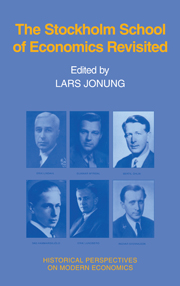Book contents
- Frontmatter
- Dedication
- Contents
- Preface
- List of Contributors
- Dramatis Personae at the end of 1937
- Introduction and Summary
- Part I The roots
- 1 The Political Economy Club and the Stockholm School, 1917–1951
- 2 Gösta Bagge, the Rockefeller Foundation, and empirical social science research in Sweden, 1924–1940
- 3 The Committee on Unemployment and the Stockholm School
- Part II The approach of the Stockholm School
- Part III The impact of the Stockholm School
- Part IV What remains of the Stockholm School?
- The Stockholm School: A non-Swedish bibliography
2 - Gösta Bagge, the Rockefeller Foundation, and empirical social science research in Sweden, 1924–1940
Published online by Cambridge University Press: 05 July 2013
- Frontmatter
- Dedication
- Contents
- Preface
- List of Contributors
- Dramatis Personae at the end of 1937
- Introduction and Summary
- Part I The roots
- 1 The Political Economy Club and the Stockholm School, 1917–1951
- 2 Gösta Bagge, the Rockefeller Foundation, and empirical social science research in Sweden, 1924–1940
- 3 The Committee on Unemployment and the Stockholm School
- Part II The approach of the Stockholm School
- Part III The impact of the Stockholm School
- Part IV What remains of the Stockholm School?
- The Stockholm School: A non-Swedish bibliography
Summary
When large philanthropic foundations came into being in the United States at the turn of the century, the sheer magnitude of their financial resources gave them the ability to shape the direction of research in those fields they chose to support. Some observers have gone so far as to suggest that these foundations have been the “gatekeepers” of contemporary American “intellectual life” (Coser, 1965). One need not go that far to recognize that the development of the social sciences in the period between the wars owed much to Rockefeller Foundation money. It has been estimated that approximately 95 percent of the total funds expended on the social sciences by American foundations during this period came from the Laura Spelman Rockefeller Memorial and its successor, the Social Science Division of the Rockefeller Foundation. As an American, I am pleased to participate in this conference by telling the story of the ways in which an American foundation contributed to the development of the social and economic sciences in Sweden.
In September 1924, Gösta Bagge, Professor of Economics and Social Politics at the University of Stockholm (Stockholms Högskola), arrived at the offices of the Laura Spelman Rockefeller Memorial at 61 Broadway in New York City armed with a formal letter of introduction dated September 16 from John M. Glenn of the Russell Sage Foundation. Bagge's purpose in approaching the American foundation, Glenn explained, was to find support for a school for social workers that he had “inaugurated and was carrying on under very great difficulties” in Stockholm.
- Type
- Chapter
- Information
- The Stockholm School of Economics Revisited , pp. 79 - 97Publisher: Cambridge University PressPrint publication year: 1991
- 5
- Cited by



